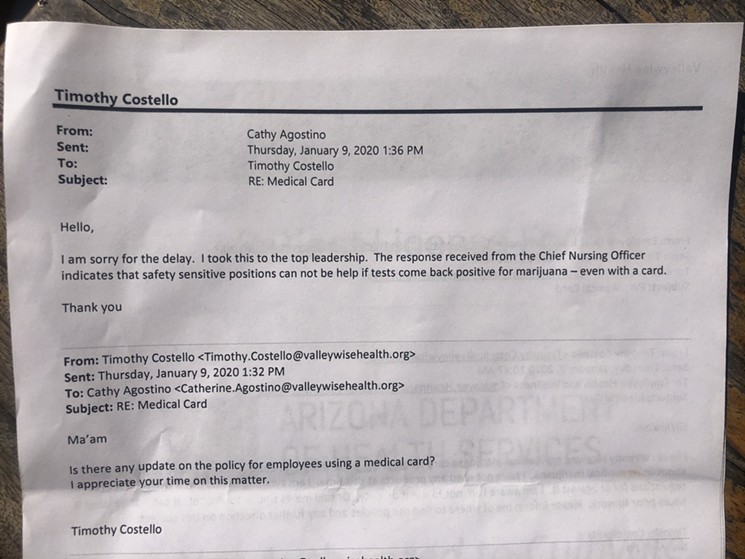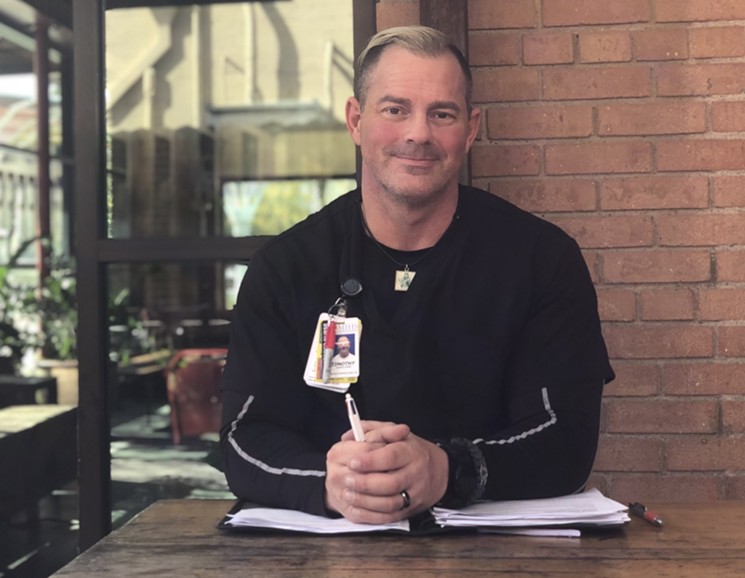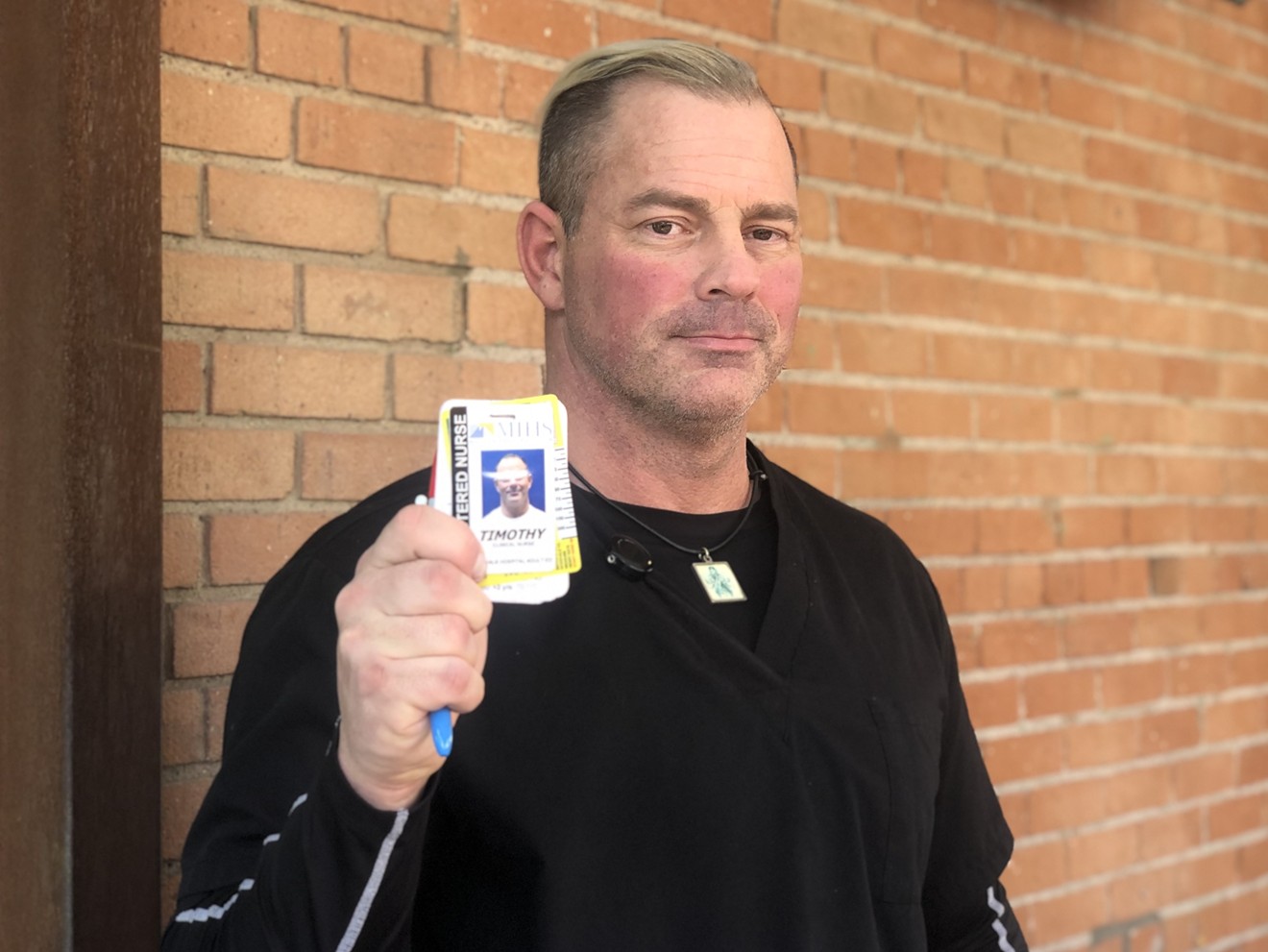Instead, his decision may cost him his job.
The 42-year-old emergency room nurse told his boss he planned to get a medical card in December. When his supervisor didn't know the hospital's policy on medical marijuana, Costello reached out to his employer, Valleywise Health.
The company's answer? If Costello tested positive for cannabis in his system — even with a legal card and even if he never used cannabis during work hours — he’d be fired.
Costello asked for more information, but the health system hasn’t yet responded. He went to the state nursing board for advice, but the documents they gave him didn't provide a clear answer. Afraid to use his new medical card but no longer wanting to take opiates or other prescription drugs, Costello waits in pain.
The workplace stalemate highlights one of the biggest unanswered questions for employees under Arizona's medical marijuana laws: Which takes precedence — the state's initial medical marijuana law, passed in 2010, or an employer protection law passed a year later that some argue is unconstitutional?
Tension Builds
Costello started as an ER nurse at Valleywise Medical Center in Maryvale in early 2019, but he’s dealt with back pain ever since he injured himself during a workout five years ago. Two bulging disks, spinal stenosis, and spinal degenerative disease give the Air Force veteran from New York the kind of pain that rips across his back and makes his muscles tighten. Sometimes, it’s so severe he can’t walk.
“I have good days and bad days,” he said. “When I work a couple days in a row, the next day I wake up, it’s usually a bad day.”
While Costello has used prescription drugs like Flexeril, Oxycodone, and Tramadol to manage the pain, and Xanax to help him sleep for the last two or three years, he said more stringent restrictions amid the opioid crisis have forced him to jump through hoops to get the medicine he needs. He’s changed insurance policies multiple times with new nursing jobs, and each time he's had to fight to get his prescriptions in order.
In December, it reached a breaking point: He visited a pharmacy two days after his medicine was ready and found his insurance company had canceled the prescription entirely.
So, in an attempt to have more reliable access to medication — and to fight against building a tolerance to addictive prescription pills — Costello decided to switch to medical marijuana. He asked his supervisor for permission before using his card, choosing to be honest and figuring it would be legal to use cannabis outside of work, given that Arizona voters legalized medical marijuana a decade ago.
He wouldn't show up to work impaired, he said, or bring cannabis to the hospital. A nurse for the last seven years, Costello takes his job seriously.

A printout of Timothy Costello's emails with his employer shows his company doesn't protect his right to use medical marijuana.
Ali Swenson
A spokesperson for Valleywise Health, the health system that owns Valleywise Medical Center and employs some 4,000 people across Maricopa County, told Phoenix New Times he couldn’t talk about specific employee matters. He said the company's policy “mirrors Arizona law” on the topic of medical marijuana and employment.
The trouble is, the history of laws governing this topic in Arizona is controversial and undefined by precedent.
The Arizona Medical Marijuana Act, which voters passed to legalize cannabis for medicinal use in the state in 2010, clearly states that employers can’t discriminate against their employees for using a medical marijuana card.
But a year later, realizing the weight of that statement, the Arizona Legislature passed a bill adding new employer protections for “safety-sensitive” workplace environments.
That law, HB 2541, says an employer can fire someone without fear of retribution if the employee is in a “safety-sensitive” role and the employer has a “good faith belief” the staffer has been impaired during work hours.
It passed the Legislature and was signed into law by Governor Jan Brewer in 2011. But some argue it violates Arizona’s 1998 Voter Protection Act, which requires any amendments to a law passed by voters to receive a supermajority vote and “further the purpose” of that law.
HB 2541 did pass with a supermajority, but critics argue it goes against the intentions of the Arizona Medical Marijuana Act by limiting patient rights.
“For that to be constitutional, it has to further the purpose of the original Medical Marijuana Act,” said Ryan Hurley, a cannabis lawyer and in-house counsel for the dispensary company Copperstate Farms. “To me, that’s a stretch.”
Constitutional or Not?
Arizona Chamber of Commerce and Industry spokesperson Garrick Taylor was involved in the passage of the 2011 law.He defended the bill's legality in an interview with New Times, saying, "The idea that we are seeking to guard against workplace accidents would seem to be a realistic and proper reaction to the passage of medical marijuana."
He argues that it's fair for employers to be worried about staff being impaired at work — and they should have the right to create policies to ensure the workplace remains safe.
But Joshua Carden, an attorney who has represented medical marijuana patients in several workplace disputes, disagrees, arguing the law is unconstitutional under the state's Voter Protection Act. He says it rolls back the anti-discrimination protections medical marijuana patients are supposed to enjoy instead of furthering the initial law's purpose.
Plus, since impairment is notoriously hard to measure with cannabis, it could lead some employers to falsely accuse their employees of using the drug at work, Carden said."I’m not like a weed crusader where I think everybody ought to smoke all the time, but I do think the law ought to be consistent."
tweet this
"Of course we don’t want actually impaired people sticking people with needles and doing surgery," Carden said. "Nobody wants that. I’m not, like, a weed crusader where I think everybody ought to smoke all the time, but I do think the law ought to be consistent."
He said employers have used the law to block their staff from using medical marijuana by arguing certain jobs are safety-sensitive, even when they're not.
"As you might imagine, employers have taken it and run with it," Carden said. "I’ve literally had cases where the finance manager at an auto dealership is considered a safety-sensitive position."
Legal cases over the years in Arizona have answered some of the lingering questions around whether schools or employers should be able to punish patients for medical marijuana use.
In 2018, the Arizona Supreme Court struck down a law that criminalized medical marijuana on college campuses, saying the law violated the Voter Protection Act by going against the intentions of the Arizona Medical Marijuana Act.
And in 2019, after an Arizona Walmart fired an employee for testing positive for marijuana metabolites on a drug test, Carden helped the patient win a civil rights case against Walmart. He argued the company had no reason to believe the employee was impaired or in possession of marijuana at work.
But, Carden said, the issue of whether or not the "safety-sensitive" provision on workplace medical marijuana use is constitutional under the Voter Protection Act has yet to be litigated.
"The stars have not aligned for me to have a straight shot at that issue in a court yet," he said.
Until then, patients like Costello who work in the medical field or other potentially safety-sensitive roles are in a precarious position — medical marijuana is legal, but if their employers find out, they could still face repercussions.
"My advice for anyone in the medical profession would be to say until a court has struck down that safety-sensitive exception — and it ought to be struck down, but until that happens — I can’t promise you that you’ll be able to keep your job," Carden said.
'I Can't Let Fear Stop Me'
Costello said several of his coworkers at Valleywise Medical Center use medical marijuana during their off hours without disclosing it to their employer. Others have told him they want to get a medical marijuana card, but they're afraid of getting in trouble.The state nursing board told New Times it has not adopted a particular policy regarding medical marijuana, but it follows Arizona medical marijuana law that prohibits state licensing boards from disciplining people for exercising their patient rights.
Now that Costello has decided to stand up to Valleywise Health to try and get a judgment protecting his right to use cannabis, he's nervous his employer will find a reason to fire him, but he's not letting that stop him.

Timothy Costello, an Air Force veteran, says the military helped him learn to appreciate his rights — and fight for them.
Ali Swenson
Costello is considering taking legal action to argue Valleywise Health can't punish him for using medical marijuana after work.
For now, he's using an herbal remedy called kratom, which his employer doesn't have a policy against, to soothe his pain.
Costello has only ever used marijuana a few times in his life, he said, so if he gets drug-tested, he'll be clean.
"Everything I do is perfectly legal and legit, and if it's not, I will not do it," he said. "No one wants to have attention directed at them in a negative fashion. But things don't happen unless you stand up."











